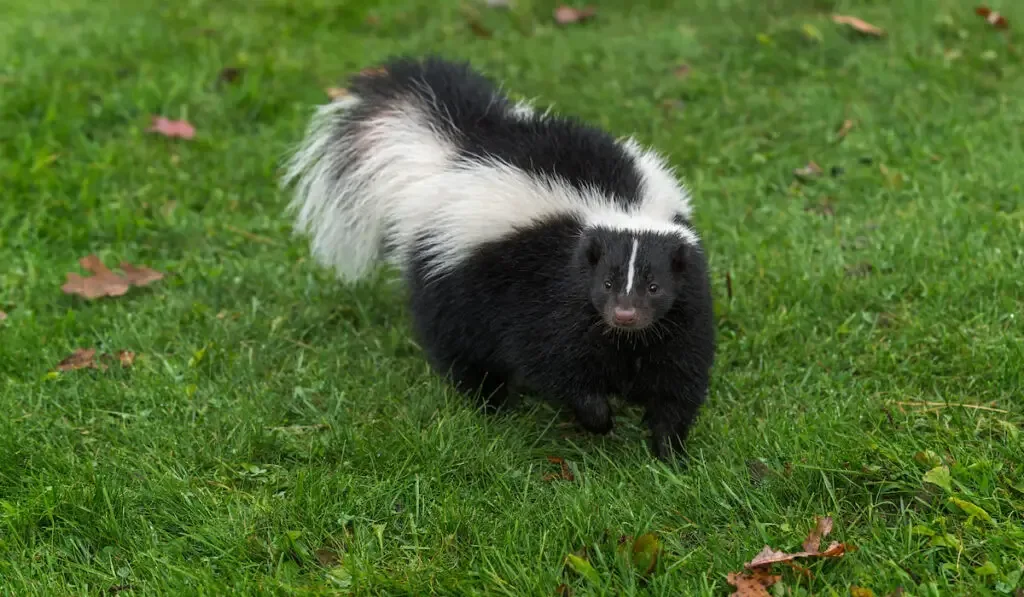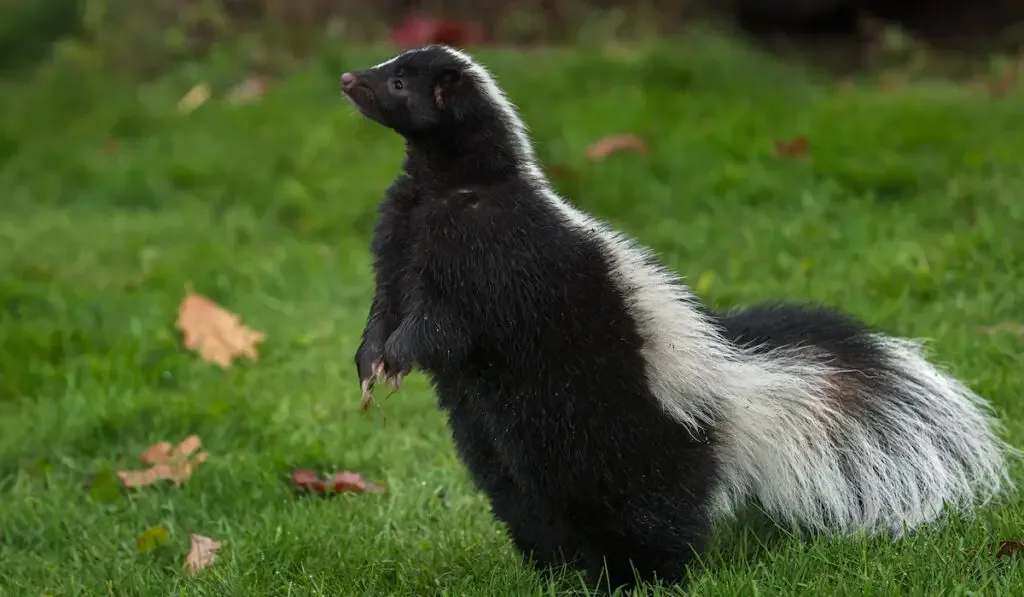If a skunk has sprayed you in your own yard once before, you need no one to tell you that you must keep the little critters away. In trying to keep skunks off your compound, you may consider installing a fence. But before you do, one question may pop up in your head for obvious reasons: can skunks jump?
Can skunks jump?
Skunks can jump, thanks to their back legs and small weight. However, they rarely ever have to jump.
More times than not, skunks do not need to jump to find food or escape predators. So, their ability to jump is not particularly impressive. Nonetheless, they can jump if they have to.
Now that you know skunks can jump, you probably want to know how high they can jump, if they can climb, and much more. To this end, we further discuss the jumping ability of skunks in the rest of this article.

Table of Contents
Can Skunks Jump?
Skunks can jump, and their powerful back legs and light weight allow for this possibility. But normally, you aren’t likely to find them jumping. Since skunks do not need to jump to forage or hunt, and since their spray typically keeps predators away, jumping is not essential to their survival.
Unsurprisingly, their jumping ability is not as great as it could be. Skunks are about the same size as house cats, and their physiques are similar. Going by this, you would think that skunks would be as agile as cats. But this is far from the truth.
While skunks can only jump as high as around 3 feet, the average cat can jump about 6 times its height. In other words, the average cat can jump as high as 5 feet.
As we already said, jumping is not essential to a skunk’s survival. Perhaps, this is why the jumping ability of skunks is not as developed as it can possibly be. Since skunks only jump as high as 3 feet, you can fence them out with a 4-5 feet tall metal fence.
However, skunks can burrow deep into the ground. So, let your fencing system extend at least 3 feet into the ground while it rises at least 4-5 feet aboveground.
Depending on the type of fence material you use, skunks might still be able to get into your yard by climbing.
Can Skunks Climb?
Thanks to their powerful, sharp claws, skunks can climb wooden or brick fences by digging their way into them.
If the fence you put up is a mesh fence, climbing may be even easier for them. When skunks climb, they can go as high as 6 feet. So, if you intend to put up a climbable fence, make sure it extends over 6 feet above the ground. This way, the fencing system will keep the skunks out for sure.

Alternatively, you could install a metal fence that has a smooth surface and let it extend around 4-5 feet above the ground. Ensure the metal is strong enough to resist the claws of a skunk. This way, the skunk will not dig into the fence to climb it. Also, since the fence is more than 3 feet, the skunks will not jump over it successfully.
Another option you have is to use an electric fence. This will send mild shocks through the body of the skunks if they try to climb the fence. As a result, they will abstain from coming close to the fence.
What Hole Size Can Skunks Fit Through?
Skunks are burrowing animals. So, when putting measures in place to shut them out of your property, you must block all possible holes they can waltz through.
So, what hole size can skunks fit through?
Skunks can fit through holes as small as 4 inches. In fact, according to this thread, skunks might even fit in a hole as small as 3.25 inches.
So, if you really want to keep skunks out, block every hole that is 3 inches or wider. Also, if you are getting a mesh fence, ensure the meshes are less than 3 inches wide. Still, we would not recommend a mesh fence keeping skunks out, unless the mesh fence is an electrical fence. As we said earlier, the mesh will make the fence climbable for the skunk.
Other Ways to Keep Skunks Out
Besides fencing and blocking possible entry holes, you can keep skunk out by using the following:
- Ultrasonic devices
- Moth Balls
- Ammonia-soaked rags
One drawback of the methods above is their effectiveness wears off with time. Then at a point, the skunks may return. So, if you can, keep the skunks out with a fencing system.

What Attracts Skunks to Your Yard
Sunflower seeds and bird seeds are the primary items that attract skunks to human spaces. But beyond those two, the following may also attract skunks to your yard:
- Heaps of debris
- Garbage
- Pet food
- Lumber
- Grills
- Openings under sheds
- Openings under your house
- Openings under decks
If you have anything that attracts skunks in your yard, getting rid of those things can help ensure the skunks stay out. So, look around and make the necessary adjustments.
Final Thoughts
Because they have strong hind legs and are lightweight, skunks can jump. But then, they can only jump as high as 3 feet.
So, if you intend to build a fence to keep skunks out, ensure it is no less than 4 feet above the ground.
Resources
- http://www.aaanimalcontrol.com/professional-trapper/skunkjump.html
- http://www.aaanimalcontrol.com/professional-trapper/skunkcanjump.html
- https://moviecultists.com/does-a-skunk-climb
- https://www.backyardchickens.com/threads/skunks-can-fit-through-what-size-hole.1340319/
- https://www.animalfactsencyclopedia.com/Skunk-facts.html
- https://animals.mom.com/what-does-it-mean-to-have-a-skunk-in-your-yard-12553570.html
- http://wildliferemovalusa.com/skunk-prevention.html
